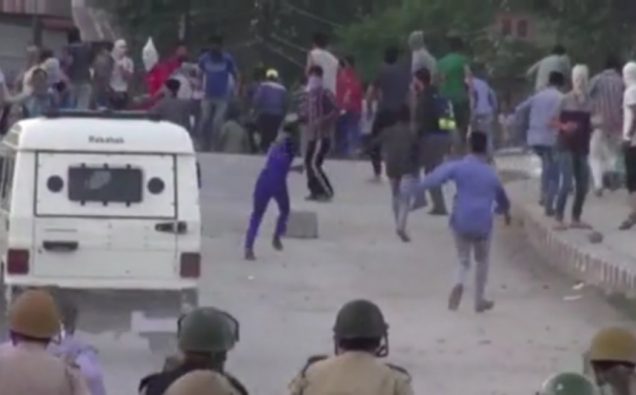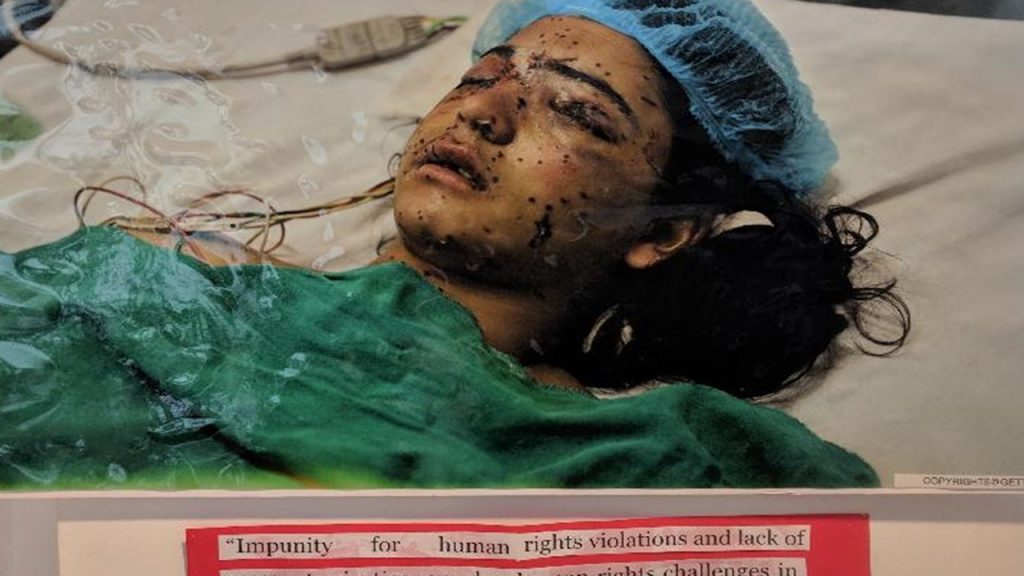
Citing a spate of dangers including restrictions, human rights violations and exclusivist Hindutva ideology of Prime Minister Nardera Modi’s ruling party, an international organization, Genocide Watch, has issued a genocide alert for Kashmir, where basic human rights are suspended in an unprecedented clampdown since August 5.
“Genocide Watch calls upon the United Nations and its members to warn India not to commit genocide in Kashmir,” the organization said in a statement.
The Watch, which seeks to prevent genocidal situations in the world, also makes a note of dehumanization of Muslims, who are called “terrorists”, “separatists,” “criminals,” “insurgents.”
On August 5, the Watch recalls, the Indian President revoked the Special Autonomous Status of India Administered Jammu and Kashmir under Articles 370 and 35A of the Constitution of India, and refers to the militarization of the disputed territory under Indian control.
India claims that amalgamation of Kashmir will bring prosperity to local people while Kashmiris see it as an attempt to change demography of their territory. Pakistan’s prime minister Imran Khan has termed the revocation of the special status for Kashmir as a ‘fascist’ move.
“India has over 600,000 troops in Kashmir. Movement of people and freedom of the press are restricted. India has cut off internet communications,” it notes.

Picture taken by Views and News of a poster exhibition on Kashmir at Pakistan Embassy in Washington D.C.
The organization lists reasons that under Prof. Barbara Harff’s risk factors for genocide. It warns against the following are early warnings of massacres in Kashmir:
- Prior genocidal massacres and continuing impunity for such killings;
- Continued armed conflict between India and Pakistan over border areas in Kashmir;
- An exclusionary ideology of “Hindutva” – India as Hindu nation – by Modi’s ruling BJP;
- Authoritarian military rule without legal restraints imposed by civilian Indian officials;
- Rule by a minority military force (Hindus and Sikhs) over majority Muslim citizens;
- Cut-off of communications and outside access by internet, media, and trade;
- Widespread violations of basic human rights – torture, rape, 2-year detentions without charge, arbitrary arrests and deportations of Muslim political and human rights leaders.
Putting the situation in the historical context, the Watch says at the time of Indian and Pakistani independence in 1947, Jammu and Kashmir was a princely state with a majority of Hindus in Jammu and a majority of Muslims in Kashmir.
During Partition, its Hindu Maharaja chose to remain independent. When Pashtun militias invaded from Pakistan, the Maharaja acceded to the Union of India and India airlifted in troops.
Fighting between Pakistani militias and Indian troops ensued, it adds.
“India took a dispute with Pakistan to the UN Security Council, which passed Resolution 47 of 1948. It called for withdrawal of Pakistani fighters and reduction of Indian troops in Jammu and Kashmir. It also called for a plebiscite to determine Jammu and Kashmir’s future. The plebiscite has never been held. India and Pakistan both assert sovereignty over Kashmir. They divide the territory along the “line of control.” They have fought three wars since independence. Both nations have nuclear weapons.”
It also recalls the last major uprising in Kashmir that began in 1984, Kashmiri Muslim youth began demonstrations for Kashmiri indigenous self-determination that were crushed by Indian armed forces.
“Riots destroyed Hindu properties in 1986; armed Muslim insurgents targeted Hindus in 1989; and in 1990, over 100,000 Hindu pandits fled from Kashmir. Human Rights Watch reported that 50,000 people were killed in Kashmir from 1989 to 2006. The Kashmir State Human Rights Commission has evidence of 2,730 bodies buried in 40 mass graves. The Commission reported over 8000 disappearances. The Jammu and Kashmir Coalition of Civil Society said that by 2016, there were over 70,000 killings, most by Indian forces. Amnesty International reports that disappearances, torture and rape by Indian Army units against Kashmiri Muslims are common.”
Genocide Watch says its Ten Stages of the genocidal process are also far advanced:
- Classification: Hindu and Sikh Indian Army “us” vs. Kashmiri Muslim civilian “them;”
- Symbolization: Muslims have Muslim names (on ID cards), Kashmiri language, dress, mosques;
- Discrimination: Hindu pandits were economically dominant until 1990; BJP reasserted Hindu power;
- Dehumanization: Muslims are called “terrorists”, “separatists,” “criminals,” “insurgents;”
- Organization: 600,000 heavily armed Indian Army troops and police dominate Kashmir;
- Polarization: Modi and the BJP incite anti-Muslim hatred; social media spread falsehoods;
- Preparation: The Indian Army occupies Kashmir; BJP leaders speak of the “Final Solution” for Kashmir;
- Persecution: Kashmiri Muslims are locked down, subject to arrest, torture, rape, and murder;
- Extermination: Genocidal massacres occurred during Partition; since 1990, there have been at least 25 massacres with death tolls over 25: 10 of Muslims by Indian troops; 15 of Hindus by Muslim militants;
- Denial: Modi and BJP say their goals are to “bring prosperity” and “end terrorism”; they deny any massacres. No Indian Army troops or police are ever tried for torture, rape or murder. Modi’s takeover is popular in India.

















